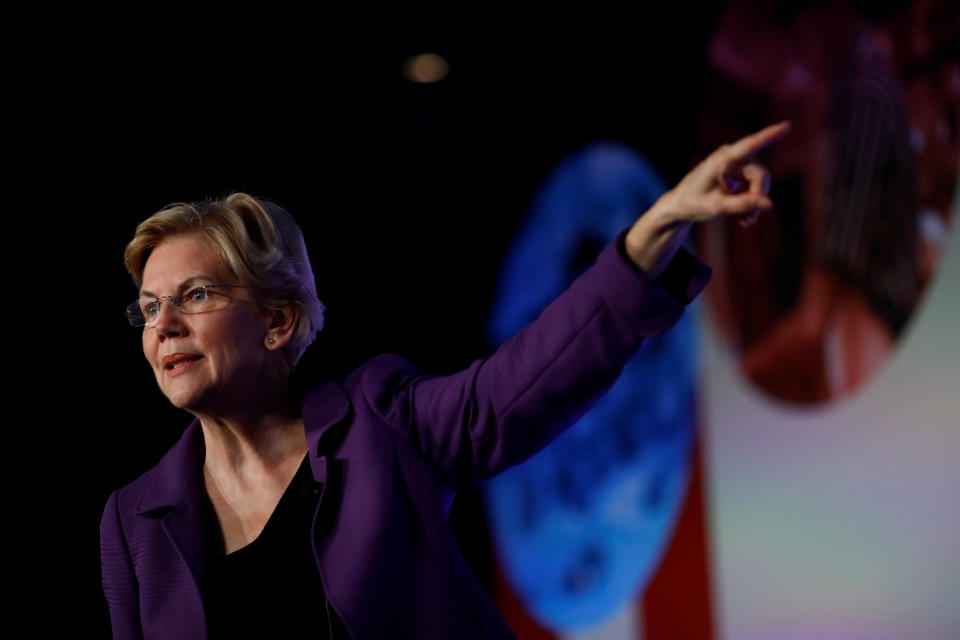Elizabeth Warren’s Climate Justice Plan Aims To Keep Water Public, Study Pollution More
Democratic presidential candidate Elizabeth Warren released a sweeping climate justice plan on Wednesday morning, vowing to ramp up research on the health effects of pollution and discourage the transfer of public water services to for-profit companies.
The 12-page memo marks the Massachusetts senator’s eighth climate-related proposal since launching a presidential campaign built on an ambitious slate of policy plans at the start of the year.
The latest proposal collects much of Warren’s existing ideas on improving racial equity and reducing pollution and reframes them in what looks like an ambitious, nearly 5,900-word blueprint on how to implement a Green New Deal.
“Justice cannot be a secondary concern ― it must be at the center of our response to climate change,” Warren wrote in the memo. “The Green New Deal commits us to a ‘just transition’ for all communities and all workers. But we won’t create true justice by cleaning up polluted neighborhoods and tweaking a few regulations at the EPA.”
The document borrows heavily from the plan laid out by former climate candidate Jay Inslee, who quit the Democratic presidential primary in August to run for reelection as Washington’s governor, including efforts to quantify pollution inequity between communities and apply that data to decisions on where to invest Green New Deal money. Warren also proposes turning the White House Council on Environmental Quality, a currently sleepy office tasked with coordinating public health policy across federal agencies, into an environmental justice hub.
The Warren plan offers fewer wonky details on which agencies should do what work than the Inslee proposal did. But notably included in the senator’s release are calls to increase research funding at the Centers for Disease Control and Prevention and to overhaul drinking water infrastructure, putting an end to the privatization of water delivery.
Under her administration, Warren would “fully fund” the CDC’s “environmental health programs, such as childhood lead poisoning prevention, and community health investigations” and would “provide additional grant funding for independent research into environmental health effects.” Her campaign declined to share an exact dollar figure.

It’s a relatively novel idea to include the CDC in a campaign climate plan, something the other leading environmental champions in the race have omitted so far. Yet it’s likely to be popular. In February, representatives from four dozen public health groups sent a letter to House lawmakers pleading for an increase in federal funding for the CDC’s “critically underfunded” lead and climate programs. The CDC is the fourth-most favorably viewed federal agency and has some of the most bipartisan support, a Pew Research Center poll found in September. Yet the CDC’s operating budget fell nearly $1 million between the 2018 and 2019 fiscal years.
Warren’s plan goes beyond just researching the effects of lead poisoning. Citing the recent lead contaminations in the drinking water of Flint, Michigan, and Newark, New Jersey, she said her administration would “end decades of disinvestment and privatization of our nation’s water system ― our government at every level should invest in safe, affordable drinking water for all of us.”
Ramping up federal spending on water infrastructure is a staple of Democratic campaigns at this point, particularly as Newark’s former mayor, now-Sen. Cory Booker (D-N.J.), is running for the presidential nomination. But curtailing the transfer of control of public services from government agencies to private companies is another issue altogether.
The private water industry serves 73 million Americans, according to National Association of Water Companies data. For-profit water services put public health at risk, a 66-page paper by University of Louisville law professor Craig Anthony Arnold argues, because the profit motive incentivizes companies to provide better services to customers who pay more and to maintain infrastructure with an eye to the length of the firm’s contract. Detroit’s debt-choked public utility threatened to shut off water to nearly 17,500 households that were behind on bills last year, only to decrease the shutoff rate 70% this year. In the timing of the 2018 shutoffs, just as the city was looking to privatize its utility, the left-wing think tank Centre for Research on Globalization saw an effort to streamline a troubled facility before selling it off to profiteers.
Other cities are actively opposing such privatization. Last November, Baltimore became the first big city in the United States to ban water privatization with an amendment to its charter.
Wednesday’s proposal did not make clear whether a Warren White House would take explicit steps to discourage municipalities from switching to private water. But the campaign said an influx of federal funding to overhaul water infrastructure should make switching to private water services far less appealing.
Income and race are strong indicators of how much pollution exposure Americans can expect to face. Black neighborhoods, on average, have air that’s 48% more polluted than that in white neighborhoods, an NAACP report found last year, and Black Americans are 75% more likely to live in neighborhoods abutting industrial sites. The journal Environmental Research published a study last year that determined Black, Hispanic and poor students face the highest risks of inhaling toxic pollutants in crumbling schools across the country.
Related Coverage
The Democrats In Detroit Are Still Unclear On How To Stop The Next Flint Water Crisis
Jay Inslee, Climate Candidate, Exits 2020 Presidential Race
Elizabeth Warren Visits Michigan’s Most Polluted ZIP Code
Love HuffPost? Become a founding member of HuffPost Plus today.
This article originally appeared on HuffPost.

